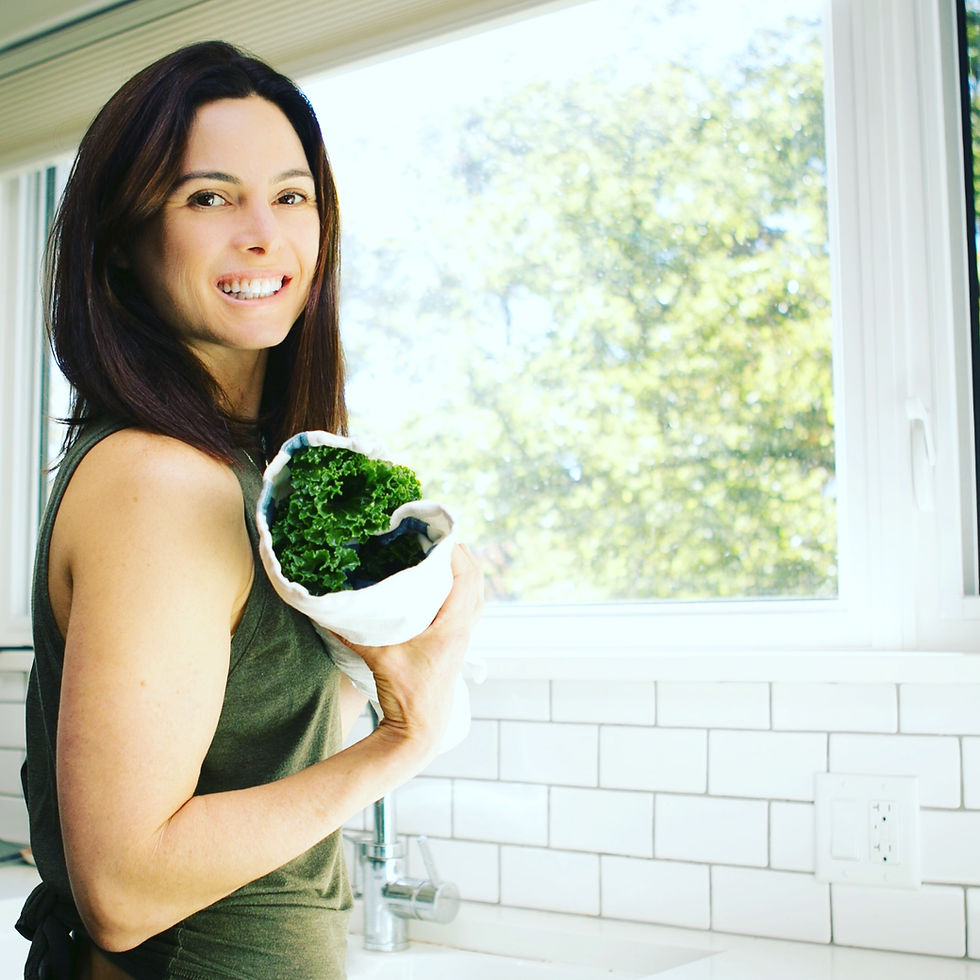NBSV 047: Dr. Chana Davis on how Beyond and Impossible burgers compare to beef. Are they healthy?
- Karina Inkster
- Jun 18, 2019
- 4 min read
Updated: May 15, 2021

Dr. Chana Davis is a scientist with a PhD in genetics from Stanford, and 10 years of experience in cancer research and personalized medicine. She is a plant-based Vancouver mom of 3 who is passionate about sleuthing out and sharing science-based, plant-smart advice.
Today we discuss all things next-generation plant-based burgers (specifically, Beyond burgers and Impossible burgers). We discuss whether these burgers are healthy (and the definition of “healthy”), and how they compare to beef in environmental impact. We’ll discuss glyphosate (an ingredient in Roundup) within the context of these burgers, and how the Beyond and Impossible burgers differ from each other.
Meat analogues like these are excellent sources of plant-based protein. But there’s still a myth that surrounds this: that plant proteins are “incomplete” proteins. Chana does some amazing B.S.-busting around this issue.
Also on the menu is the natural versus synthetic fallacy. Just because something is “natural”, doesn’t mean it’s healthy. Some of the most toxic substances on the planet are completely natural, and not manmade. Similarly, organic does not mean pesticide-free - so you’ll hear about the pesticides used in organic farming, and their regulation (or lack thereof).
Listen below!
Important topics and points you don't want to miss:
>> Are Beyond and Impossible burgers healthy? What does "healthy" mean, anyway?
>> What are the key differences between Beyond and Impossible burgers?
>> Nutritionally and environmentally, how to these plant-based burgers compare to beef?
>> A discussion of glyphosate in the context of these vegan burgers.
>> Organic versus conventional farming. Organic does not mean pesticide free.
>> The natural versus synthetic fallacy. Just because something is “natural”, doesn’t mean it’s healthy.
Connect with Chana:
Research & references:
How much glyphosate are we exposed to? How do these levels compare to the safe limits?
Urine testing of farmers, families, and consumers. (2015)
Urine levels in organic vs conventional consumers. (2014)
Review of regulatory limits on glyphosate - why is the IARC an outlier in their carcinogenicity assessment?
KEY MESSAGE:
"It appears that IARC has overreached in its conclusion by failing to consider the vast body of literature supporting the notion that glyphosate is not a carcinogen. Besides, IARC has failed to place potential hazard into a context of actual risk. When the conditions of glyphosate use in Egypt is rationally analyzed, it appears that exposure of the public to glyphosate is order of magnitudes far below the zero-risk dose. Therefore, glyphosate can be continually used in Egypt with some restriction measures to minimize its risk even further."
KEY MESSAGE:
"This review presents the scientific basis of the glyphosate health assessment conducted within the European Union (EU) renewal process, and explains the differences in the carcinogenicity assessment with IARC. Use of different data sets, particularly on long-term toxicity/carcinogenicity in rodents, could partially explain the divergent views; but methodological differences in the evaluation of the available evidence have been identified. The EU assessment did not identify a carcinogenicity hazard, revised the toxicological profile proposing new toxicological reference values, and conducted a risk assessment for some representatives uses. Two complementary exposure assessments, human-biomonitoring and food-residues-monitoring, suggests that actual exposure levels are below these reference values and do not represent a public concern."
Do conventional fruits and veggies provide health benefits?
CHANA'S COMMENT:
This study reviews 95 studies of fruit and veggie intake and relationship to several health outcomes (notably overall mortality and cardiovascular). The word organic is no where to be seen in this publication - in other words, these people are eating conventional produce. I should note, however that this review, and the studies within it, come with the big disclaimer that they don't PROVE that the fruits and veggies were the direct (and sole) cause of lower overall mortality and CVD because they are observational. People that eat lots of fruits and veggies are typically also living a healthy lifestyle so it's hard to figure out how much of their health benefits are coming directly from the fruits and veggies. However, the fact that we see this relationship strongly across so many studies (the 95 in this review and many more) really strengthens the case for a causal relationship.
Calories and macros on a vegan diet: A free e-book for you!
Download Karina’s free 32-page ebook that shows you how to track your food, calculate calories, and set macro goals on a vegan diet. You’ll even get step-by-step instructions – complete with a printable grocery list – for how to prep a week’s worth of delicious Buddha bowls in 60 minutes or less.
To share your thoughts: Comment on the episode's Facebook post. Episode Transcript: Access a full transcript of this episode here.
To support the show: Leave an honest review on iTunes. Your reviews really help, and I read each one!
Subscribe to the show: iTunes, Stitcher, Spotify, or Google Podcasts.





